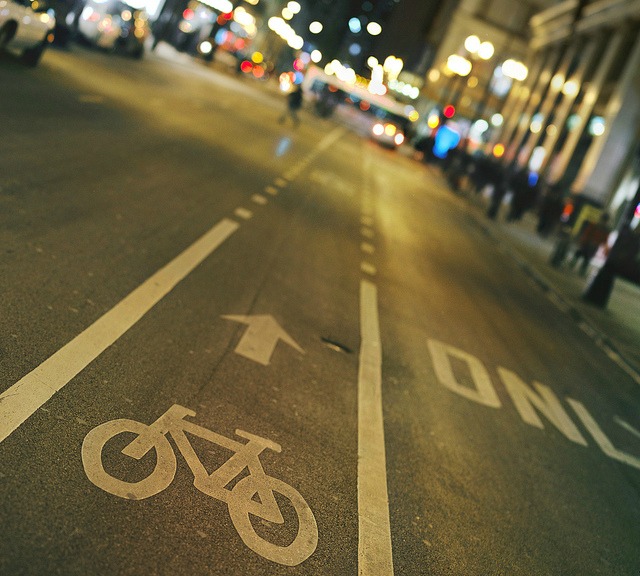Cycling Advocates Condemn Tribune's 'Victim-Blaming' Editorial
By Stephen Gossett in News on Sep 2, 2016 3:45PM
This summer has been a particularly dangerous one for cyclists in Chicago, as four cyclists have been fatally struck between mid-June and mid-August. In response to the tragedies, the Tribune Editorial Board on Thursday published an op-ed in which they called for cyclists and motorists alike to “slow down” and “exercise basic courtesy and caution.” But despite much diplomatic language, the piece has angered prominent voices in the cycling community for being tantamount to “victim-blaming.”
The editorial begins by recapping the four fatalities, a catalog with which cyclists are all too familiar: Courier Blaine Klingenberg, 29, was hit and pinned underneath a double-decker tour bus, near Oak Street and Michigan Avenue, just north the Magnificent Mile, in June. Virginia Murray, 25, was fatally struck in a right-hook collision in July while riding a Divvy in Avondale. Art student Lisa Kuivinen, 20,was hit by an 18-wheel flatbed truck in August while riding in the bike lane along a busy stretch of Milwaukee Ave. And Francisco Cruz, 58, was killed the following day in a hit-and-run crash in West Garfield Park. The driver who killed Cruz has yet to be apprehended.
But then, the op-ed moves into a gross mischaracterization of the so-called “Dennis’ Law,” a recently passed state law intended to make the Illinois Vehicle Code completely clear that lawful cyclists possess all right-of-way rights. The law was necessitated by the death of cyclist Dennis Jurs, who was fatally struck by a driver who failed to yield at an intersection in which Jurs had no stop sign, but the driver did. Nevertheless, the Tribune makes mention of the law as to scold motorists and cyclists—despite the fact that Jurs exhibited no misconduct and, equally important, none of this summer’s four Chicago fatalities appeared to be at fault either.
“That law takes effect Jan. 1, but we hope every driver and every bicyclist abides by this commonsense message right now. That means obeying traffic lights, watching for pedestrians, respecting other drivers — whether they're in an Escalade or on a fixie. Today. In the commute home. In the jaunt to the lakefront. In travels across the city.”
It’s false equivalence dressed up as diplomacy. As Yasmeen Schuller, owner of The Chainlink message forum, sees it, the “disappointing” op-ed places the “the focus of the ‘solution’” unfairly on the cyclists “i.e. victim blaming."
Schuller wrote:
"Determined from eyewitness accounts, cameras, and analysis, there is a lot of responsibility involving the commercial drivers:
• Blaine was struck by a bus that reportedly went through a red.
• Virginia was struck by a flatbed truck reportedly failed to signal and failed to account for cyclists.
• Lisa was struck by a flatbed truck that drove into her lane and hit her.
• Fernando was the victim of a hit-and-run driver that is still at-large even though it was captured on camera."
"Every single one of these could have happened to any one of us," Schuller told Chicagoist.
Jim Merrell, Advocacy Director of Active Transportation Alliance, says that overall the media narrative has shifted into a more nuanced discussion, but tendencies like those exhibited in the Tribune op-ed remain problematic. He singled out one particularly unhelpful line:
"Some may think (cyclists) shouldn't have to obey the same rules of the road as motorists. Some don't appear to be obeying any rules except survival of the fastest."
"Subtle jabs like that aren’t helpful in getting us beyond the bikes vs. cars approach," he told Chicagoist. "It put the focus on the myth of recklessness, when we should be turning to something more constructive." Merrell says he is looking forward most to the city's action-oriented, data-driven Vision Zero model, which aims to eliminate traffic-related fatalities and is expected to be released in the fall.
"We certainly appreciate the attention being brought to the issue", he added "But the piece fails to grasp the most important thing to discuss: the disparity of vulnerability. People walking and biking are at far greater risk."
The Tribune hints at this point, but ultimately falls well short, failing to underline how dramatically more vulnerable cyclists are and again drawing false equivalency between those most at risk and those with the most potential to harm:
"Motorists don't own the road, we know that. But cars do outweigh the average bicycle by a couple of thousand pounds at least. So bicyclists have to be particularly cautious on heavily traveled city streets where bike lanes may not exist, or may be buffered or shared, not protected by curbs. Defensive biking is always a good idea. And motorists with the obvious advantage need to be extra watchful."
"Lets eliminate the myths once and for all and focus on what really kills cyclists," Schuller said. "It's not rampant recklessness among cyclists, its distracted and altered drivers: DUIs, texting while driving, bike lane obstructions by parking, construction and commercial vehicles, and lack of enforcement" (The Tribune makes very brief mention of construction-related blockages but fails to explore the issue, which has become particularly noteworthy; and it makes not mention of the common link of commercial vehicles.)
"Please don't add your name, or anyone else's, to the list," reads the editorial in closing. But as cycling advocates voiced, this year's victims did not choose to add their names to the list of fatalities. And while the Tribune has toned down some of its more egregious anti-bike rhetoric, the various omissions and glosses in Thursday's piece once again fail to adequately approach the issue of bicycling safety.
